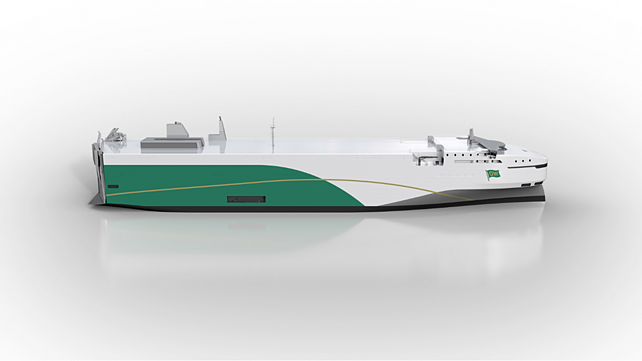
Volkswagen Group Logistics has ordered four ships with dual-fuel engines that can be powered with environmentally-friendly liquid gas. These vessels should be travelling the world’s oceans by the end of 2023, serving the North American route between Emden in Germany and Veracruz in Mexico. On the return trip, the LNG ships will transport new vehicles destined for Europe. Soon, six of the nine car carriers crossing the North Atlantic for Volkswagen will be powered by LNG.
Each year, the Volkswagen Group ships 2.8 million new cars. The group has been transporting most of its new vehicles overseas using low-emission LNG ships (LNG – liquefied natural gas). The first two LNG car carriers entered service in 2020.
The further decarbonisation of shipping will result in substantial CO2 reductions, with the use of liquid gas enabling the automaker to cut the ships’ CO2 emissions by up to 25% (tank-to-wake).
Exclusive long-term agreements have been signed with shipowners Wallenius Marine and SFL Corporation to use the four new car carriers on the North Atlantic route. The state-of-the-art ships are being built in China, and each one has a capacity of around 7,000 CEU (car equivalent units), which corresponds to between 4,400 and 4,700 vehicles from the Volkswagen Group’s model mix. The dual-fuel engines with a capacity of 13,300 kW will power the ships from MAN Energy Solutions and, in eco-speed mode, will be able to travel at speeds of 15 to 16 knots (28 to 30 km/h).
In contrast to other LNG-powered marine engines, the two-stroke engines from MAN Energy Solutions use a high-pressure technology that results in virtually no methane slip, making the ships chartered by Group Logistics especially climate-friendly. The two LNG ships that came into service in 2020 are also equipped with this climate-friendly technology, which was a critical factor in choosing these ships, the company said.
The use of LNG not only reduces CO2 emissions but also cuts the emissions of nitrogen oxides by up to 30%, soot particles by up to 60% and 100 % sulfur oxides. In addition, the liquid gas-powered car carriers require no modification to run on alternative non-fossil fuels such as biogas, e-gas from renewable sources and biodiesel.
Simon Motter, Head of Volkswagen Group Logistics, said, “In line with the group’s commitment to e-mobility and climate-neutral production, the LNG fleet used by Logistics represents a major contribution to making Volkswagen net carbon neutral by 2050. The new ships will also permit non-fossil fuels in the future, thus reducing CO2 emissions even further. Our aim is to make all our transport operations – by water, road and rail – environmentally friendly, clearly demonstrating the Volkswagen Group’s pioneering role in climate-friendly logistics.”